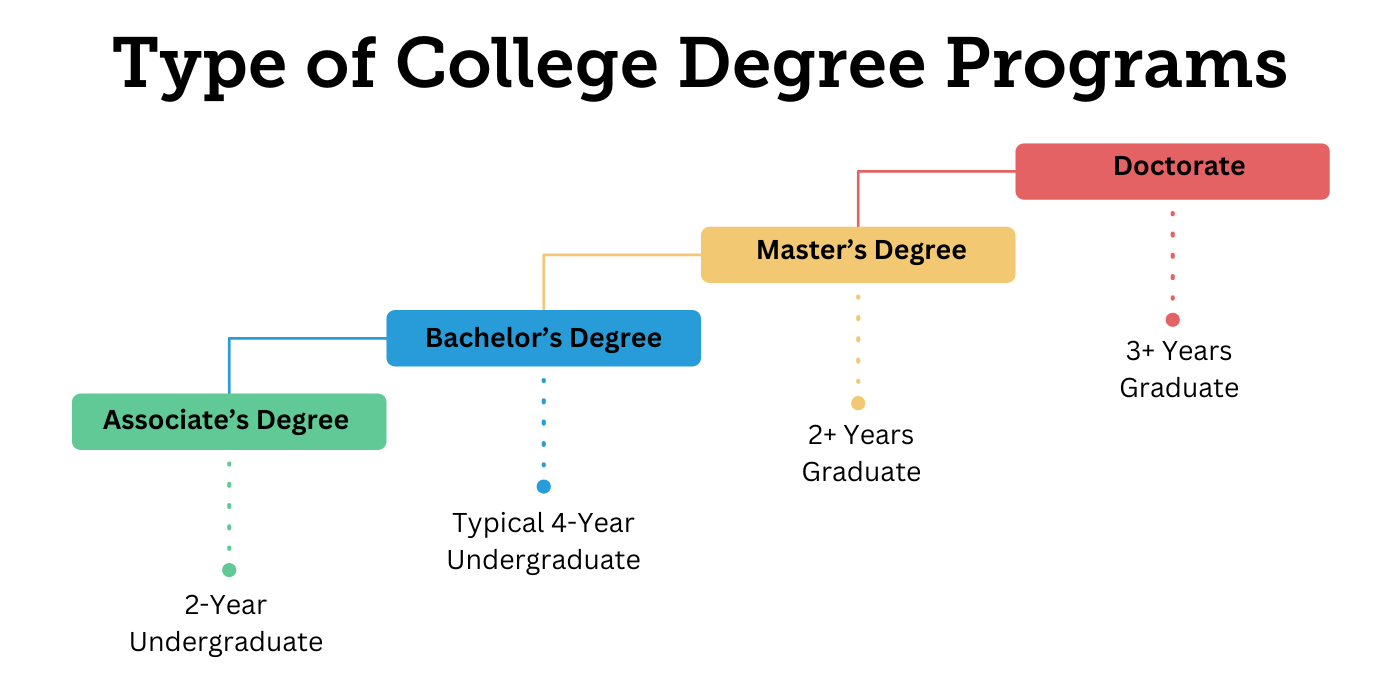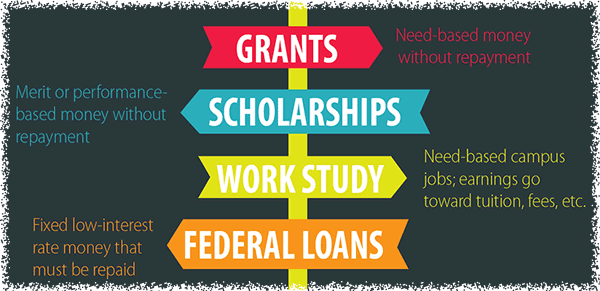
College
Studies show that people with a college degree tend to earn more than their non-degree counterparts*. There are many resources available to help fund your education if that is your biggest hurdle. Attending college can also offer an opportunity to explore new lands and live independently.
Whether you decide to go to college close to home or far away, there are some things you should know about the application and enrollment processes.
Frequently Asked Questions
When are applications due?
Most college applications are due in January.
Scholarship apps?
Early Action vs. Early Decision
timeline- apply, award letter, acceptance
note about senior spring grades matter
Undergraduate vs. Graduate... what's the difference?
There are different types of degree programs in college.
Undergraduate Programs: Going to college for the first time. When you apply for colleges in 12th grade, you will seek undergraduate degree programs.
-
- Associate’s Degree– “2-year” degree that can lead to certifications
- Bachelor’s Degree– typical “4-year” degree
Graduate Programs: You have earned a college degree already and want to go back for more.
-
- Master’s Degree– Often used to… . Some schools offer 4+1 programs, which means in five years you can graduate with a Bachelor’s AND Master’s degree in one package.
- Doctorate Degree– The highest form of education in one’s field of study. There are several types of Doctorates including medical doctors (MD), research doctors (PhD), educational doctors (EdD), etc. The length of time to earn a doctorate can vary depending on the type, ranging from 3 years to 7+ years.

How do I order my transcript?
To order a final high school transcript to be sent to your college, university, or trade school, you must first create a Parchment Account.
You will send your transcripts a few times: First, when you are applying for colleges. Again, when you graduate and the college/university/trade school needs your final grades at the end of senior year.
- Go to https://www.parchment.com/students/how-it-works/ and click the green button that says “Order Now”
- Select your school: Type in “William Penn High School” and ensure it is the WPHS in New Castle, DE.
- Start to create your account. Ensure that the green icon for Ordering Your Own Credentials is checked. You MUST use a personal email, not a Colonial email address. You will lose access to your Colonial email after you graduate. Click “Continue“.
- Fill out your personal information to finish setting up your account. Choose a password. Click “Create Account & Continue“.
- Once your account has been created, you will select which college/ university/ trade school you want the transcript to be sent. Ensure you are selecting the correct branch/ campus, if your institution has multiple options.
- When you get to the check out screen, you MUST schedule when you want the transcripts sent. If you are applying to colleges in Fall of 12th grade, you can “Send Now”. If you are graduating, it is VERY IMPORTANT that you select “Hold for Grades”. This way, your transcript will not be sent until final grades are in and your Senior transcript is complete.
- Click green “Complete Order” button to send it through. You should get a confirmation email.
If you participated in Dual Enrollment or Early College courses and need to transfer college credits, view more information here.
What is the SEED program?
also mention inspire scholarship at DSU
What is the FASFA and how do I fill it out?

What is Financial Aid
- Financial aid is money to help pay for college (2-year or 4-year) or trade/career school.
Types of Financial Aid
- Grants – Money that does not have to be repaid. Can come from a variety of sources such as the college, state or federal government.
- Work-Study – Program that allows you to pay for school while working part-time.
- Loans – Money borrowed to pay for college that must be repaid.
- Scholarships – Colleges and many nonprofit and private organizations offer scholarships to help students pay for college or career school. Scholarships may be based on academic merit, talent or program of student. Also see PWHS scholarship list.
When to Apply – www.FAFSA.gov
- Seniors can apply for financial aid beginning in December 2023 for the 24-25 school year. The application used is the FAFSA-Free Application for Federal Student Aid. It is available online at www.fafsa.gov. Students are encouraged to apply as soon as possible once the new application is available. Make sure you check with the colleges you are applying to for their deadlines. You may print a pre-application worksheet for Web filers from the website.
- You and your parent/guardian can also prepare by applying for a US Department of Education FSA ID at https://studentaid.gov/fsa-id/create-account/launch. Your FSA ID enables both you and your parent/guardian to sign your FAFSA electronically. There is also information about federal student aid on this site. If you prefer to file a paper copy, you can download a form from the website or request a paper copy by calling 1-800-433-3242. This is a free application. Be sure to go through the official website. Watch for websites wanting to charge you!
CSS Profile
- Certain Colleges require the PROFILE to be filed along with the FAFSA. There are also specific scholarships that require the PROFILE. Registrations for PROFILE are accepted beginning October 1st. Application can be found at www.collegeboard.org. You cannot actually file the PROFILE until after October 1 of the senior year.
Financial Aid Websites:
- https://studentaid.gov/fsa-id/create-account/launch – The FSA ID is the first step to completing the FAFSA. Your FSA ID enables both you and your parent/guardian to sign your FAFSA electronically. Can be done before October 1st.
- www.fafsa.gov – FREE Application for Federal Student Aid – Seniors can apply once the new application is available in December 2023.
- www.cfnc.org
- www.studentaid.gov
- https://studentaid.gov/aid-estimator/
College Steps




